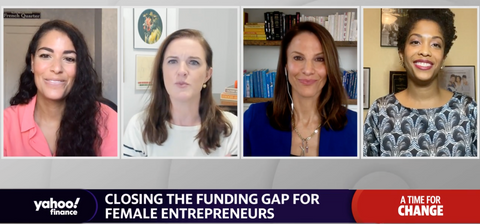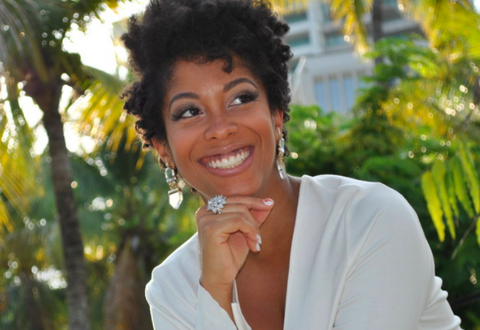IFundWomen Founder & CEO Karen Cahn and KAZMALEJE Co-Founder LaToya Stirrup join Yahoo Finance’s Jennifer Rogers and Kristin Myers the discuss the lack of funding options for women entrepreneurs on this week’s A Time For Change.
Video Transcript
[MUSIC PLAYING]
KRISTIN MYERS: Welcome to "A Time for Change" now in its new time. I'm Kristin Myers here with Jen Rogers. We want to chat today about women-owned businesses and the difficulties women face, particularly women of color, in starting and keeping their businesses going.
JEN ROGERS: So let's get into some of the numbers. We have this chart, and it really shows the stark differences for women raising money for a startup. Only 1% of Black founders received venture capital funding compared to 77% of their white counterparts. The numbers aren't that much better for Hispanic business owners. Only 2% of them receive VC funding.
KRISTIN MYERS: So we are going to be digging into this now. We're joined by Karen Cahn, founder of IFundWomen, which teamed up with American Express for the 100 for 100 Grant Program, which gave 100 Black women both money and mentorship to help grow their businesses.
We're also joined by Latoya Stirrup, co-founder of the Miami-based Kazmaleje. I see you trying to take a picture. Hopefully someone at home can get one for you. Kazmaleje has a tool for curly wavy hair. So I'm very excited to hear all about it, considering my hair. Latoya is one of the women participating in the program.
So Karen, I want to start with you. We just saw some of those numbers that Jen was reading out, which shows a huge gap in VC funding between the different races. So that's where we are right now. I'm wondering, how do we create equity in funding and ensure that Black and Hispanic women get the same amount of money as their white peers?
KAREN CAHN: Yeah, so that's a great question. And that is the problem that IFundWomen is working on solving, which is that there is a complete lack of funding options for early stage women entrepreneurs. And the data you showed was for all-- for men and women. So the data for women is in 2019, female-founded companies received a mere 2.8%-- 2.8% of venture capital dollars. And female founders of color received exponentially less than 1%-- 0.32% to be exact.
So when you look at just women, the numbers are even worse than what you just showed. And, you know, only 1% of companies, regardless of the gender of the founder, will ever raise venture capital. So what do the other 99% of startup founders do? They tend to max out their credit cards, or they go into debt, funding the earliest days of their business.
And at IFundWomen, we dogmatically believe that no one should go into debt funding their proof of concept stage. So we've built a marketplace for funding where businesses like Kazmaleje and Latoya-- hey, I haven't seen you or spoken to you in a while. But we work with tens of thousands of entrepreneurs across many stages, from idea stage all the way through to a Series A stage on raising capital that is debt-free through online fundraising and through corporate grants.
And equally as important, we work with our founders on coaching-- tactical practical information on how to start and run a business, everything from how and why to set up your Google Analytics to how to do retargeting ads to how to create a subscription product, how to pivot, how to market during COVID.
So, starting a business isn't just about capital. Of course, most women will tell you that the lack of access to capital is the number one barrier to them starting up. But half of women will tell you that the lack of access to coaches and mentors to literally show you how to do it and a community of entrepreneurs to collaborate with is also a huge barrier, which is why we're so excited to partner with American Express, who shares that same core belief of capital coaching and connections and is providing all of that to 100 Black female entrepreneurs.
JEN ROGERS: So let's bring in Latoya, of one of those women. So your business, actually-- I told Kristin she's going to have to wait 'cause a couple items were sold out on your website. So you've been doing pretty well. Part of what Karen was just talking about was this mentorship and this community and doing this during COVID.
And I want to get into that because we have-- we know women are being hit disproportionately hard during COVID in terms of their careers, having to deal with childcare, having their kids in school at the same time that they trying to run companies. As an entrepreneur, right now in this, how has it been operating during COVID, given the myriad issues that Karen just laid out, that already, we've [INAUDIBLE] with? And now we have this other wrench in the works.
LATOYA STIRRUP: Yes, no, completely agree. You know, these were unprecedented times. And a lot of us-- for example, we're relatively new, right? We launched on the market in 2019. So this year, we wanted it to be a huge growth year. And it has been, and we've done some amazing things. But when you just think about how everything just kind of came to a screeching halt, and so many of us had to pivot and think about new ways to make sure that our brands and our companies will survive-- and we were very intent on doing that.
And we were excited, one, that we could have a product that our customers needed during this time. So many women have started to embrace their natural curl texture because they couldn't go to the salons. They couldn't go to the beauty supply stores. So we were able to deliver tools direct to their home that would allow them to take care of themselves, their hair, as well as the hair of their family members-- their kids, right? There's a lot that was going on.
So when you just think about how businesses became very essential, those who you didn't necessarily think about became essential to the way that we are living right now has been amazing. And to be able to still be here and to be one of the businesses chosen as a part of the AmEx 100 for 100 is phenomenal.
KRISTIN MYERS: Latoya, I want to ask you a little bit about the supply chain. And you talk about working with other change makers. I know that you're focusing a lot on climate change. I know in making your products, really reducing the amount of pollution that's out there.
But I'm wondering if you're finding, as we are all discussing, really, increasing equity, making structural changes, I wonder if you run into difficulties that there aren't enough other change makers in the supply chain. You know, talking from people that make the product and manufacture it to the logistics of getting it to the doors of your clients and your customers, I'm wondering if, from you, as you're seeing it, that we need to not just talk about this endpoint, right, helping women like yourself, but also really fixing throughout the entire chain some of these issues.
LATOYA STIRRUP: Yes, because one of the things that we did for sure was to partner with Repurpose Global. So the initiative that you're speaking about is that we are now the first and only hair tool company that is certified plastic neutral. So we want to make sure that as we're developing our tools, that we're taking into account what's happening around us and the climate change, to your point, as well as the clean beauty movement.
Customers are a lot more sensitive and keen to pay attention to how businesses are relating to the issues that matter to them. So we wanted to make sure that early on, we set those aspects in place for our business specifically. And so, even though we're small, this allows us to basically offset the plastic that we use in our manufacturing and in our product packaging.
And, you know, as we're continuing to grow, that's what we want to do, right? We want to be able to go down our supply chain and make sure that each step is able to be as eco conscious as possible. So yes, there are a lot of brands. There are a lot of companies that are assigned to solve this problem. But it will be great to see it to happen faster, for sure. Because these are issues that are pressing, and they're very current. And they're happening now.
JEN ROGERS: I think we'd all like to see a lot of this happening faster. Karen, one statistic that jumped out to me in this American Express study that they had done, which kind of was part of launching this, was that women of color represent 39% of the total female population in the United States, but account for 89% of the net new women-owned businesses per day.
So women of color are starting businesses at an outsized rate, but there's this huge gap in revenue once they get those businesses going. Is that an important number to focus on? Do you want-- do you think that that needs to be closed? How do we do that?
KAREN CAHN: So revenue is the best kind of funding that you can get for any business, period, end of story. So the reason that women, and particularly, women of color, are not generating the revenues as their male counterparts is because they are not given-- we are not given funding, period. We just talked about venture capital. Men get 97%-- 97% of the VC dollars.
And it's not just relegated to VC the funding gap problem. When you go to banks and you take out a small business loan, oftentimes, women, and particularly, women of color, are given lower loan amounts to the tune of 30% to 50% lower loan amounts than their male counterpart. If you took two businesses, one, you know, a Black female-owned business and one a white male-owned business, and you-- they were the same business, same traction, same revenue, the white male-owned business would get a 50% higher loan amount than the Black woman-owned business.
And so, when you have just such a deficit of working capital to start with at the beginning, it becomes so much harder to grow and scale your business because we're just scraping along with whatever the table scraps were given. And it's enough. That is literally why we started IFundWomen. So the revenue numbers are incredibly important to look at because that's what is-- that's the most important funding you can get.
And then, of course, the funding numbers from VC, from the banks-- and the systemic sort of racist and biased and sexist algorithms that exist and algorithms are built by humans, right? Humans put in the data, and the algorithms process it. And these algorithms are so outdated that everybody is using to make funding decisions. And at IFundWomen, we are literally rewriting the code so that women, particularly women of color, get the funding that they deserve to get their businesses off the ground and scaling.
Because the ironic part of all of this is when you look at loans, for example, women are more fiscally responsible and are more apt to pay their loans back faster and on time than our male counterparts. Yet, we don't get the higher loan amounts. But we do get higher loan rates. So the whole system needs to change.
KRISTIN MYERS: Right. Well, sadly, we will have to leave that there. Karen Cahn from IFundWomen and Latoya Stirrup, co-founder of the company Kazmaleje, thank you both for joining us today.
LATOYA STIRRUP: Thank you.
KAREN CAHN: Thank you for having us, and thank you to American Express for the amazing work you're doing.
LATOYA STIRRUP: Absolutely.





Comments (0)
There are no comments for this article. Be the first one to leave a message!